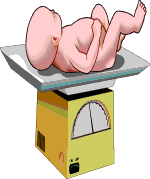
 |
The Power That Heals the Body |
Youíre in for your babyís third well visit. Everything
is going fine. Heís six months old and crawling all over the house. He
looks at you with those wondrous, trusting eyes, and gives you that toothless
grin with such ease. He seems to kiss you but you ignore the fact that
heís really just trying to nurse on your cheek. It doesnít matter, heís
prefect. The nurse comes in and gives you a paper. "Whatís this?"
you ask. She answers, "Itís the standard disclaimer and release form
for the new AIDS vaccine. Just read and sign. Weíll give Jimmy the shot,
and you can go home. Heís healthy as a horse." 
This is coming. Just wait. President Clinton wants it to happen. AIDS activists want it to become reality. Doctors who treat AIDS patients will like the idea. The pharmaceutical company that makes the stuff will love it. Will you? Will you let them inject live attenuated HIV virus or some portion of it into your baby? If not, how far will you go to prevent it from happening? Last time I checked, AIDS is still a condition of lifestyle for the vast majority of cases. Personally, I would prefer to teach my children why they should not participate in high-risk behaviors, and give them the personal power necessary to avoid these high-risk behaviors, rather than risking them with such an injection. What will you decide to do when this comes up? A decision is what is necessary, yet so few people know that they have the right of a decision. Thatís why GVAL exists. Anytime a health question comes up; you have to make a decision. If you do not, the medical system has made one for you. The question is whose decision is better? Yours, or theirs? I think yours is much better, and I would like to offer some proof. Robert Mendelsohn, M.D., in his book, "Confessions of a Medical Heretic," stated that in Israel in 1973 the doctors went on strike. They reduced their daily patient contact from 65,000 to 7,000. During that month long strike, the death rate dropped 50%. Similar results occurred during a strike 20 years before. The same results were observed in Bogota, Columbia when the doctors struck in 1976 for 52 days and the death rate dropped 35%. And finally, in L.A. County, California, in the same year, the doctors went on a work slowdown to protest their outrage at soaring malpractice insurance rates, and the death rate dropped 18%. "When the strike ended and the medical machines started grinding again, the death rate went back to where it had been before the strike. (1) Please understand this is not because medical doctors are evil and uncaring. Actually, I have good friends that are medical doctors and care very much. However, the tools that they have employed, drugs and surgery, can be extremely dangerous. Obviously, it is wise to avoid medications at nearly all-possible costs. How do I do that? You ask. I talk to dozens of people per day and most of them say, "I donít like taking drugs. I would rather handle the problem some other way." The problem is even if you donít like drugs, if you get sick, what are you going to do? Will you allow your body to get better on its own? Will you run to the doctor? What if you get worse? What if itís life threatening? Do you know the difference between a life threatening situation and one that isnít? Most donít. So, your decision is made for you. When you get sick, you go to the doctor. He prescribes a medication or surgery if things are really bad. You take the drugs. End of decision. You see, the reality is, if we get sick most of us donít believe that our body has the inherent resources to heal itself. We take the drugs. This is how you were raised and this is how you raised your children, with very few exceptions. When you would get sick, and run a fever, what was the first thing your parents did? They gave you aspirin or Tylenol for you younger folks. What do you do when your kids get a fever? You probably give them tylenol. Why? Because thatís what you were taught to do, despite the fact that the fever is a natural part of your immune system that helps fight off the nasty little germs. You really do not believe that your body has the ability to heal itself. It must be helped, by something; tylenol, advil, dimetapp, amoxicillin, augmentin, etc. This list is truly endless. What would it take for our bodies to have the resources to heal itself without intervention? Thatís easy. Experience. A lifetime of getting sick and in each case successfully healing without the use of drugs or surgery. Very few people have had this experience. I havenít for that matter. We werenít raised that way. But I know who has, and who these people are will answer first question.
(1) "Iatrogenic Disease, The Hidden Cost of Medicine," Koren publications, 1991. Richard Lindwal, D.C. GVAL Advisory Board |